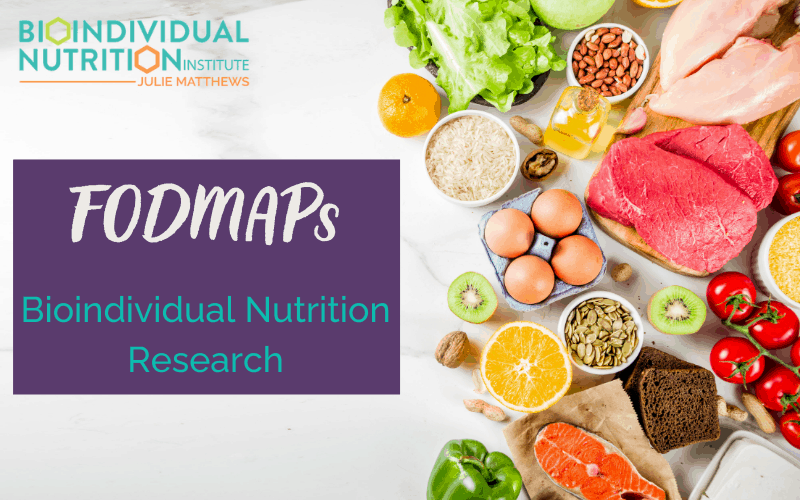
The right personalized nutrition plan for your client can bring about profound improvement and benefit.
In this article, I want to focus on a diet that can be helpful for your clients, especially those with gastrointestinal issues: The low FODMAPs diet.
For those not familiar with FODMAPs, it is an acronym for fermentable oligo-, di-, monosaccharides and polyols – which are short chain carbohydrates and alcohol sugars fermented by bacteria. And the Low FODMAPs diet is an elimination diet that removes/reduces these foods when they cause difficulty for an individual.
Low FODMAPs diet restricts foods such as: certain fruits with high fructose like apples, pears and mango; high fructose corn syrup; lactose-containing dairy products; fructans such as onions, garlic, inulin, and wheat; galacto-oligosaccharide rich foods including beans and legumes, as well as foods with polyols like avocados and prunes.
The sugars reduced or eliminated on a low FODMAPs diet need to be digested and absorbed in the gastrointestinal tract, and some people have a decreased ability to digest these disaccharides and/or absorb the monosaccharides. Oligosaccharides and polyols need to be fermented by bacteria, and some people have either too much or too little of the wrong bacteria in the wrong place, causing pain and digestive upset with these carbohydrates and sugar alcohols.
When you consume FODMAPs, they travel through the gut and are a food source for your gut microbiome. Unfortunately, when imbalanced gut bacteria eat FODMAPs they can produce hydrogen or methane gas – causing gastrointestinal discomfort in sensitive people. FODMAPs can also trigger diarrhea by bringing water into the gut. For people with a food intolerance to FODMAPs, symptoms may include gas, bloating, distension, diarrhea, or constipation. In fact, FODMAPs have been linked with IBS.
A severe GI disorder like IBS causes significant pain and discomfort, and supporting our clients quickly and effectively is important. Nutritional intervention can be powerful in reducing or eliminating GI distress. That is where the low FODMAPs diet can be effective for some clients, but not all. So who needs to be on a low FODMAPs diet?
This is something that I cover extensively in the BioIndividual Nutrition Training program. I teach practitioners in my professional program to consider symptoms, diet history, conditions, lab results, genetics, microbiome, and more.
Below, I break down 8 different research studies looking at the low FODMAPs diet and how it may benefit your clients and patients with IBD, IBS, and fibromyalgia.
Efficacy of Diet Therapy in IBD: A Review
 Although dietary choices play a crucial role in the progress of inflammatory bowel disease (IBD), diet is rarely addressed by clinicians, probably due to lack of nutrition knowledge and time constraints. This study includes many diet therapies including low FODMAPs.
Although dietary choices play a crucial role in the progress of inflammatory bowel disease (IBD), diet is rarely addressed by clinicians, probably due to lack of nutrition knowledge and time constraints. This study includes many diet therapies including low FODMAPs.
A 2019 review of clinical studies conducted over the last 3 to 4 years concludes that:
- Exclusive enteral nutrition (EEN) (aka tube feeding) is effective in cases of complicated Crohn’s disease (CD) with either inflammatory strictures or enterocutaneous fistulas but isn’t useful in ulcerative colitis (UC). EEN helps decrease antigen exposure in the intestines and thus reduces the likelihood of an anti-inflammatory response in the body. However, EEN is unpalatable and may not be an effective long-term solution.
- Crohn’s disease exclusive diet combined with partial enteral nutrition is a promising approach for patients with severe CD. This diet eliminates all foods that could promote gut dysbiosis.
- Specific carbohydrate diet (SCD), which eliminates complex carbohydrates and processed foods, is recommended for both CD and UC. However, the review’s authors do not prescribe this diet in their practice due to excessive weight loss and adherence issues. The authors also recommend monitoring vitamin D levels in patients who choose to be on the SCD.
- Autoimmune paleo diet (AIP) involves eliminating pro-inflammatory foods as well as those that can damage the gut’s lining. While results are promising, more studies are needed.
- Low FODMAP diet is recommended for patients with active GI symptoms or with structuring or fibrostenosing disease.
The efficacy of the following supplements was also reviewed:
- Curcumin – 3g/day recommended for patients with moderate UC
- Omega-3 – Not currently recommended due to lack of observed benefits
- Vitamin D – 50,000IU weekly if lab results indicate a deficiency
The authors concluded that, while it is important to address the benefits of diet therapy in IBD, it is also crucial to come up with strategies that will ensure long-term adherence to the diet.
Study Reference: Damas, O. M., Garces, L., & Abreu, M. T. (2019). Diet as Adjunctive Treatment for Inflammatory Bowel Disease: Review and Update of the Latest Literature. Current treatment options in gastroenterology, 17(2), 313-325.
The low-FODMAP Diet and IBS: Efficacy, Adherence, and Weight Management
 The low FODMAP diet eliminates highly fermentable carbohydrates and has shown promising results for patients with digestive issues like IBS. However, since it is quite restrictive, the low-FODMAP diet can cause excessive weight loss and is considered by many to be difficult to adhere to.
The low FODMAP diet eliminates highly fermentable carbohydrates and has shown promising results for patients with digestive issues like IBS. However, since it is quite restrictive, the low-FODMAP diet can cause excessive weight loss and is considered by many to be difficult to adhere to.
In a recent 8-week study which aimed at assessing the tolerability of the low FODMAP diet, scientists recruited 63 patients with IBS. The participants’ complaints were recorded on a validated questionnaire before and after implementing standardized dietary advice about the low FODMAP diet. The Bristol stool form scale was used to document characteristics of bowel movements.
The results confirmed the effectiveness of the low FODMAP diet for patients with IBS.
While 30 patients (47% of the study sample) dropped out of the study and 36% of the remaining patients reported considerable weight loss during the study…
79% of the patients who completed the study reported significant improvement in their overall symptoms:
- Abdominal pain – 85%
- Meteorism (rapid accumulation of intestinal gas) – 79%
- Flatulence – 69%
- Borbogymi (rumbling or gurgling noise in the intestine) – 69%
- Fatigue – 69%
- Nausea – 46%
Moreover, the severity of symptoms decreased, and stool characteristics improved in 14 patients.
Study Reference: Frieling, T., Heise, J., Krummen, B., Hundorf, C., & Kalde, S. (2019). Tolerability of FODMAP–reduced diet in irritable bowel syndrome–efficacy, adherence, and body weight course. Zeitschrift für Gastroenterologie, 57(06), 740-744.
The low-FODMAP Diet and IBS: Efficacy, Adherence, and Weight Management
 According to a study published this year, the IGUBAC Diet® plus a turmeric-based supplement could help alleviate some of the symptoms of fibromyalgia in the short term.
According to a study published this year, the IGUBAC Diet® plus a turmeric-based supplement could help alleviate some of the symptoms of fibromyalgia in the short term.
13 women aged 30 to 60 were selected from the Research Centers in Nutrition and Health, and Asociación de Fibromialgia de Madrid, in 2016. None of these women were pregnant, breastfeeding, under corticoids medication and none had renal disease, turmeric allergies, or a severe psychiatric disorder. They were randomly allocated to the study group or the control group.
For 1 month, women in the intervention group received:
- 500mg of a turmeric-based supplement, since turmeric is a natural anti-inflammatory painkiller.
- The IGUBAC Diet® (Inflammatory Gut-Brain Axis Control Diet) which is (i) gluten-free, (ii) low-FODMAP, (iii) low in histamine and other amines, (iv) preservative free, and (v) consists of natural foods. In a nutshell, this diet focuses on the interconnection between food, inflammation, and the gut-brain axis.
After one month of treatment, the scientists reported:
- Considerable improvements in pain disturbances in work activities.
- Moderate (but not statistically significant) decreases in the Fatigue Symptom Score which helps assess the presence and severity of fatigue in fibromyalgia patients.
- No significant improvement in CPGS (which measures pain intensity and pain-related disability), PCS (the pain catastrophizing scale), FIS (the fatigue severity scale), and PSQI (the Pittsburgh Sleep Quality Index).
While participants in this study may not have seen much improvement, it is worth noting that (i) the sample size of this study was very small and (ii) the IGUBAC Diet® showed promising results in other studies when it was followed for at least 2 months.
In another paper, this same team from the CINUSA Clinic in Spain have been using the IGUBAC Diet for the:
–treatment of rheumatic diseases, such as fibromyalgia(FM) or irritable bowel syndrome (IBS), in adults
–neurodevelopmental disorders, such as autism or attention-deficit/hyperactivity disorder (ADHD), in children.
They found “modulation and correction of the usual symptoms are achieved in 100% of patients after following the diet at least for 2 months.”
Fibromyalgia is considered as a chronic pain disorder with no cure. These studies highlight adjuvant therapies which include dietary changes and high-quality supplements which could provide hope and needed help to improve the quality of life in those with fibromyalgia.
Study Reference: Martin, I. S. M., Oliva, S. L., Yurrita, L. C., Rojo, S. S., & Vilar, E. G. (2019). Anti-inflammatory and antioxidant feeding and supplementation may serve as adjuvants in women with fibromyalgia. Journal of Nutrition & Intermediary Metabolism, 15, 3-9.
San Mauro-Martín, I., Garicano Vilar, E., & Lopez Oliva, S. (2018). New therapeutic approaches for chronic diseases on the rise: the IGUBAC Diet®. International Journal of Recent Scientific Research, 9, 23083-23088.
Additional FODMAP Studies
 The research on FODMAPS is extensive. It’s one of the most researched diets currently. When I put “FODMAPs” into the Google Scholar search bar over 3,500 references come up in the last 10 years alone. Here are a few more study highlights on the effectiveness of FODMAPs…
The research on FODMAPS is extensive. It’s one of the most researched diets currently. When I put “FODMAPs” into the Google Scholar search bar over 3,500 references come up in the last 10 years alone. Here are a few more study highlights on the effectiveness of FODMAPs…
A diet low in FODMAPs reduces symptoms of irritable bowel syndrome
Study conclusion, “In a controlled, cross-over study of patients with IBS, a diet low in FODMAPs effectively reduced functional gastrointestinal symptoms. This high-quality evidence supports its use as a first-line therapy.”
Study Reference: Halmos, E. P., Power, V. A., Shepherd, S. J., Gibson, P. R., & Muir, J. G. (2014). A diet low in FODMAPs reduces symptoms of irritable bowel syndrome. Gastroenterology, 146(1), 67-75.
FODMAPs alter symptoms and the metabolome of patients with IBS: a randomised controlled trial
Results found, “Histamine, a measure of immune activation, was reduced eightfold in the low FODMAP group (p<0.05). Low FODMAP diet increased Actinobacteria richness and diversity, and high FODMAP diet decreased the relative abundance of bacteria involved in gas consumption.”
And researchers concluded, “IBS symptoms are linked to FODMAP content and associated with alterations in the metabolome. In subsets of patients, FODMAPs modulate histamine levels and the microbiota, both of which could alter symptoms.”
Study Reference: McIntosh, K., Reed, D. E., Schneider, T., Dang, F., Keshteli, A. H., De Palma, G., … & Vanner, S. (2017). FODMAPs alter symptoms and the metabolome of patients with IBS: a randomised controlled trial. Gut, 66(7), 1241-1251.
In this study, researches found 50% of individuals with inflammatory bowel disease had improvement in symptoms. Abdominal symptoms, abdominal pain, bloating, wind and diarrhoea improved in patients with Crohn’s disease and ulcerative colitis; although constipation did not. Researchers concluded, “These data suggest that reduction of FODMAP intake offers an efficacious strategy for patients with IBD who have concurrent functional gut symptoms. A controlled dietary intervention trial is indicated.”
Study Reference: Gearry, R. B., Irving, P. M., Barrett, J. S., Nathan, D. M., Shepherd, S. J., & Gibson, P. R. (2009). Reduction of dietary poorly absorbed short-chain carbohydrates (FODMAPs) improves abdominal symptoms in patients with inflammatory bowel disease—a pilot study. Journal of Crohn’s and Colitis, 3(1), 8-14.
In a meta-analysis of 22 studies, 6 randomized controlled trials and 16 non-randomized studies were evaluated. Researchers found a significant decrease in IBS symptom severity scores for individual on a low FODMAPs diet. A low FODMAPs diet was found to significantly reduce the severity of abdominal pain, bloating and overall symptoms. The authors concluded, “The present meta-analysis supports the efficacy of a low FODMAP diet in the treatment of functional gastrointestinal symptoms.”
Study Reference: Marsh, A., Eslick, E. M., & Eslick, G. D. (2016). Does a diet low in FODMAPs reduce symptoms associated with functional gastrointestinal disorders? A comprehensive systematic review and meta-analysis. European journal of nutrition, 55(3), 897-906.
What is clear through these studies is how impactful the right diet can be for improvement in health and wellness, as well as reduction in symptoms and improvement in metabolic markers. Removing problematic high FODMAPs foods, when guided by an experienced and knowledgeable practitioner, can make the world of difference to individuals seeking relief from severe or persisting GI issues (and even other pain related conditions).
To learn more on personalized nutrition and therapeutic diets, like the low FODMAPs diet, and how to use them in your practice as part of a BioIndividual Nutrition plan, explore my BioIndividual Nutrition Training.



